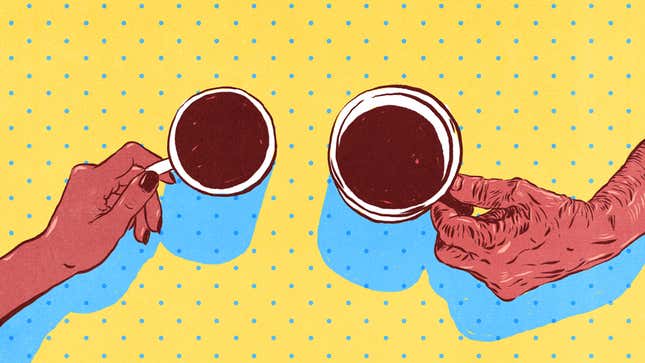When Was the Last Time You Really Thought About Getting Old?
Latest

If there is one thing I can tell you of usefulness in your life as a woman on this planet: You need to get yourself some older lady friends. You need to sit with them, and you need to let them tell you about the world. And you need to take it all in, and you need to be very, very grateful for it.
I know: Right now you are young and vivacious and alive and you can’t be bothered. It’s your time, and you want to live it—to suck the marrow out of the bones of being hot and young, or whatever it was Thoreau said. And who could blame you? But before it’s too late and you’re all old and stuff, you need to get yourself an older woman friend or five, because they are going to give you more than just insight into the past and colorful stories and (hopefully) an admirable cantankerousness, but also a roadmap to getting older. And trust me, you need one.
For a long time, I didn’t think this was true. Growing up in rural Tennessee, I was surrounded by older women: tough, hardworking, cranky gals, fonts of advice and insight into how to be in the world, remarkable examples of a kind of no-nonsense femininity I still hold in the highest esteem. But for most of my life, I was too busy, too self-absorbed, too cool or too embarrassed of my yokel upbringing to notice what these women were giving me—or even care. In my defense, a lot of teenagers are assholes, but also, I simply didn’t realize that these broads were so unique. That the world was not full of these sorts of women. That there was any other way to be.
Only in the last couple of years did it begin to dawn on me, when my grandmother and her sister died within one month of each other, that I had missed out on a wealth of wisdom, insight and good-natured ribbing. A piece over at Feminist Current has me thinking about it again.
In it, Lori Day muses on the experience of aging while female. She starts with a paragraph that, in my humble view, earns your readership outright:
I’m going to tell you a story that is so common and so troubling it is effectively split off from the emotional lives of young women, tucked away into whatever neural recesses exist for the purpose of shelving information that feels irrelevant yet distantly threatening. I wonder if young women will read this? The irony is that they probably won’t, and the silently nodding heads will be ones that are graying, like mine.
OK, OK already, we’ll read! With the gauntlet thrown, Day proceeds to explain that—like most older women—she left childhood and headed straight for three decades of the “sexual harassment, sexism in the workplace, mommy wars, pay gaps, and gendered put-downs that few females escape.”
After that, though, came a shift:
But then something happened, and if not for the mirrors in my house, I would be very confused about what changed and why. Young women, you’ll experience this too, some day. You’ll catch your reflection and your breath at the same time and be abruptly reminded that your exterior no longer matches how you feel inside, and that it now undermines the power of your voice, the voice that took decades to build up. I was talking about this to a friend recently who is 50, one year younger than I am. She said, “Oh wow. I remember my grandmother telling me the exact same thing about being shocked by her reflection in the mirror because she still felt like a young woman inside, and she was 80.” So this probably will not end for me, nor for any of us given the gift of not dying young. It bears remembering.
Men do not catcall me anymore, and I’m happy to have aged out of that, although some of my friends are not. My daughter is grown, so the mommy wars rage on without me. I’m now happy to be self-employed—an escape hatch from workplace sexism that is not available to all women, and one that I fully appreciate. I charge what I want as a consultant and will never again stumble across information at the office that a male co-worker who is younger, less educated and less experienced than me makes more money than me simply because he belongs to the penis-owning gender. I am not free of the physical and sexual dangers all women live with, but they have receded somewhat for me at this stage of my life.
But that liberation isn’t really a liberation, Day writes:
I have simply been transported into the next phase of sexism that comes with middle age, and it’s a dramatic change well illustrated metaphorically by the female body that is ogled and objectified transforming into the female body that is invisible.
In our defense, it’s not that we don’t know old age coming—we are not in denial—it’s just that most of us want to maximize whatever power we have while we have it, whatever that means, and cross that dilapidated old bridge when we reach it. We think that, because there’s nothing we can do about getting older, there’s no point in thinking about it. So we don’t think about it. And we don’t listen to older women who could give us a heads-up.
-

-

-

-

-

-

-

-

-

-

-

-

-

-

-

-

-

-

-

-

-

-

-

-

-

-

-

-

-

-

-

-

-

-

-

-

-

-

-

-








































